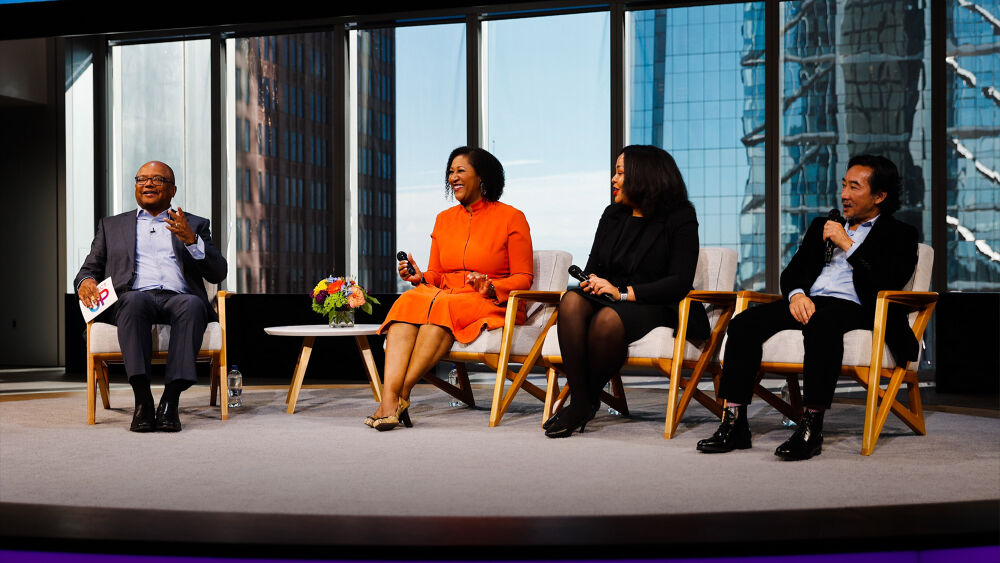Digital Opportunity
Broderick Johnson: Championing Digital Equity - A Story of Partnership
The core of my passion for digital equity lies in partnership. It’s what comes up most frequently when I’m talking with the organizations that are in our communities doing the work and with government officials at every level.
What is an effective partnership when it comes to closing the digital divide? The answer is very different today than it was a decade ago, when Comcast first launched our Internet Essentials program.
Fast forward 11 years, today at the Comcast Technology Center in Philadelphia, I had the pleasure of spending time connecting with and listening to hundreds of Comcast’s digital equity allies at the inaugural Project UP Partner Summit.
The two-day summit brought together more than 200 nonprofit leaders from across the nation to network with one another and to participate in digital equity activities, including hearing from expert speakers, participating in workshops, and sharing best practices.
200+
community leaders
To kick off the day, it was my privilege to introduce FCC Commissioner Geoffrey Starks, a demonstrated leader in advancing digital equity. NBC News reporter Zinhle Essamuah then conducted a keynote interview with Commissioner Starks.
Among the many compelling observations the Commissioner made today was this: “These are fundamental issues of fairness and fundamental issues of equity. But it is a complex problem.”
He then went on to outline what he sees as the three main issues that we face: access, affordability, and adoption.
Government at all levels: local, state, and federal, will be an invaluable partner going forward as tens of billions of dollars in infrastructure funds are distributed and committed to projects over the next decade. It’s on all of us to ensure those funds are used most efficiently to connect every home to the Internet and critically, give folks the tools to be successful and safe online.
Commissioner Starks also touched on efforts to eliminate disparities in broadband adoption rates for communities of color, considering of all Americans without a broadband subscription, 35% are Hispanic and 29% are Black.
It was noteworthy to watch this conversation while sitting among an audience of on-the-ground leaders who see the impact of these efforts in their communities. And the Commissioner credited them with much of the success we’ve seen, but also challenged us all to continue to innovate.
It’s really, especially back to your question about communities of color — the trusted community member and organization telling a fellow neighbor, ‘you know about this program, right?’
“Really it’s about you all as community leaders. I can sing from the highest perch, ‘we need to sign folks up for free Internet,’ but it’s really those community relationships,” said Commissioner Starks. “It’s really, especially back to your question about communities of color — the trusted community member and organization telling a fellow neighbor, ‘you know about this program, right?’”
The issue of trust emerged as a common thread through several conversations today, including our Spotlight on Connectivity panel, during which I spoke with three community leaders from across the country, including one right here in Philadelphia.
All three of these amazing organizations center their digital equity efforts on providing comprehensive and compassionate assistance to the folks they serve–and meeting people where they are.
Julia Fearing, a resident services manager for the Detroit Housing Commission, said one thing in particular about the residents she serves in Detroit that is so important for all of us to consider as we move forward.
“You can talk all day and you can have a pretty face all day, right? But guess what, are you going to follow through? That’s a big key component in our communities. Because they lack trust with anybody,” said Fearing. “A lot of people have past traumas and we know that. So we try to help assist them as much as possible, and that’s how we can incorporate ACP, because now they trust me.”
Thoai Nguyen, CEO of the Southeast Asian Mutual Assistance Association Coalition added later that, “As we’re migrating some of the most basic, fundamental needs of all of us toward the digital space, not having access to it is not the end of the world, but it’s going to limit your possibilities.”
Dorri McWhorter, the President & CEO of the YMCA of Metropolitan Chicago, drove home why tailoring to specific needs of communities is the key to success.
“Because in 2022 our services are so comprehensive — we’re literally serving babies to seniors, one of the things that’s important for us is, whoever that digital navigator is in that space has to understand what that community needs and how to approach that community,” McWhorter said of meeting the needs of over 25 YMCA sites she oversees.
Finally, I was so pleased to use the summit to announce that Comcast is doubling the upload speed of Internet Essentials Plus service, our signature low-cost offering for eligible families. This will enable our subscribers, many of whom receive the service for no cost thanks to the Affordable Connectivity Program, to do even more of what they love online.
2x
Comcast is doubling the upload speed of Internet Essentials Plus service
We have never been better positioned to make our digital economy work for everyone in America. My biggest takeaway from the Project UP Partner Summit today is excitement for the future. All of us are working toward a single goal of achieving digital equity – however that may manifest itself in our various communities. Together, let’s finish the job.
Broderick Johnson is Executive Vice President, Public Policy and Executive Vice President, Digital Equity for Comcast Corporation.
Project UP is Comcast’s comprehensive initiative to advance digital equity and help build a future of unlimited possibilities.
